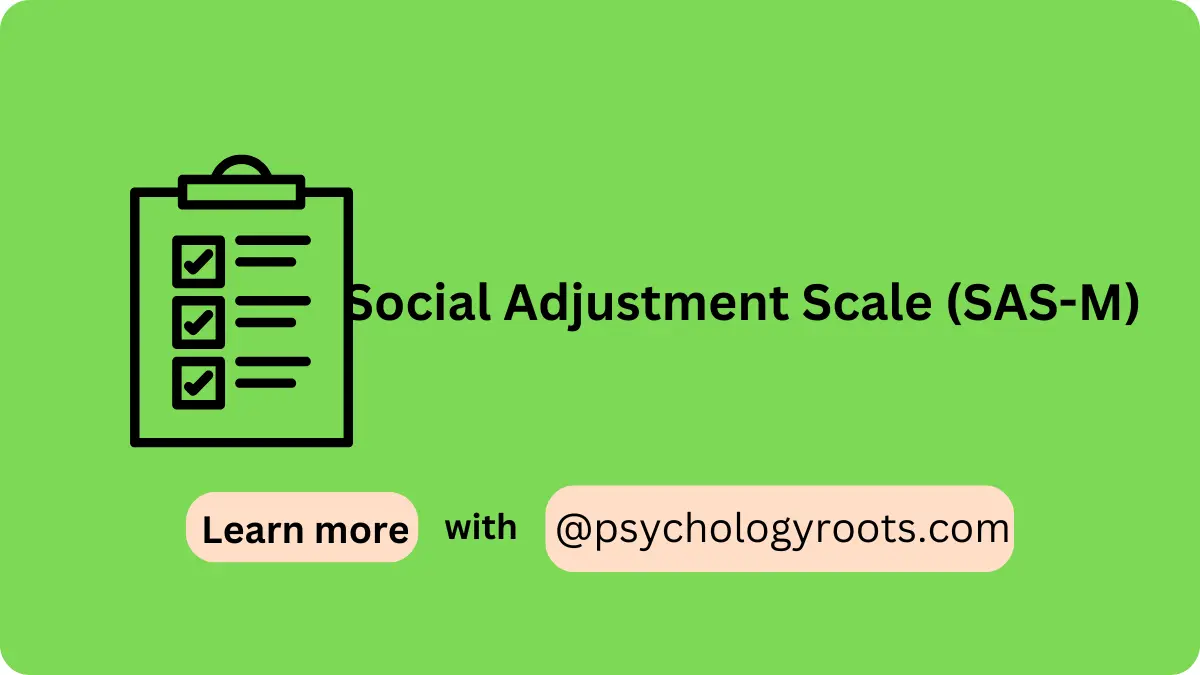Table of Contents
Social Adjustment Scale (SAS-M)
Here in this post, we are sharing the “Social Adjustment Scale (SAS-M)”. You can read psychometric and Author information. We have thousands of Scales and questionnaires in our collection (See Scales and Questionnaires). You can demand us any scale and questionnaires related to psychology through our community, and we will provide you with a short time. Keep visiting Psychology Roots.
About Social Adjustment Scale (SAS-M)
Scale Name
Social Adjustment Scale (SAS-M)
Author Details
Myrna M. Weissman, PhD, Sallye Bothwell, MaEd
Translation Availability
English

Background/Description
The Social Adjustment Scale (SAS-M) is a comprehensive assessment tool designed to measure social functioning and adjustment across various domains of an individual’s life. Originally developed by Weissman and Bothwell, this scale has been widely used in clinical and research settings to evaluate how well individuals manage their roles and relationships within different social contexts, including work, family, and leisure activities.
The SAS-M is particularly beneficial for understanding the social impacts of mental health disorders such as depression, anxiety, and personality disorders. It provides a structured approach to identifying areas where individuals may experience difficulties, enabling clinicians and researchers to tailor interventions and track changes over time. The scale consists of multiple items that assess specific aspects of social functioning, such as role performance, interpersonal relationships, and social support.
One of the key strengths of the SAS-M is its versatility. It can be self-administered or conducted through an interview, making it adaptable to different populations and settings. Its ability to provide nuanced insights into the social dimensions of mental health makes it a valuable tool for both clinical diagnosis and therapeutic planning.
Administration, Scoring and Interpretation
- Obtain an authorized copy of the SAS-M along with detailed instructions.
- Explain the purpose of the scale, emphasizing its role in assessing social adjustment in various life domains.
- Provide clear instructions on how to complete the questionnaire, whether self-administered or via interview.
- Inform respondents about the estimated time required, typically 20–30 minutes.
- Administer the scale in a distraction-free environment to ensure accurate and thoughtful responses.
Reliability and Validity
The SAS-M has been extensively validated and shows high reliability across diverse populations. Internal consistency and test-retest reliability are robust, ensuring consistent results over time.
The scale’s validity is supported by its strong correlations with other measures of social and psychological functioning. It has been widely used to assess the social implications of various mental health conditions, proving its sensitivity and specificity in detecting changes in social adjustment. Its psychometric properties make it a gold-standard tool for evaluating social functioning in clinical and research contexts.
Available Versions
45-Items
Reference
Weissman, M. M., & Bothwell, S. (1976). Assessment of social adjustment by patient self-report. Archives of general psychiatry, 33(9), 1111-1115.
Important Link
Scale File:
Frequently Asked Questions
What is the SAS-M used for?
It is used to assess social functioning and adjustment in various life domains.
Who developed the SAS-M?
It was developed by Weissman and Bothwell.
How is the SAS-M administered?
It can be self-administered or conducted via an interview.
What conditions is the SAS-M used for?
It is commonly used to evaluate social adjustment in individuals with depression, anxiety, and personality disorders.
How long does it take to complete the SAS-M?
The administration typically takes 20–30 minutes.
Disclaimer
Please note that Psychology Roots does not have the right to grant permission for the use of any psychological scales or assessments listed on its website. To use any scale or assessment, you must obtain permission directly from the author or translator of the tool. Psychology Roots provides information about various tools and their administration procedures, but it is your responsibility to obtain proper permissions before using any scale or assessment. If you need further information about an author’s contact details, please submit a query to the Psychology Roots team.
Help Us Improve This Article
Have you discovered an inaccuracy? We put out great effort to give accurate and scientifically trustworthy information to our readers. Please notify us if you discover any typographical or grammatical errors.
Make a comment. We acknowledge and appreciate your efforts.
Share With Us
If you have any scale or any material related to psychology kindly share it with us at psychologyroots@gmail.com. We help others on behalf of you.